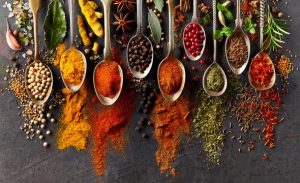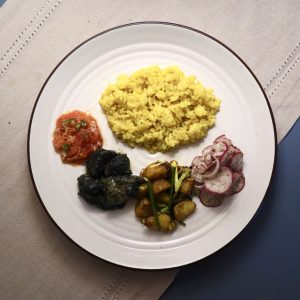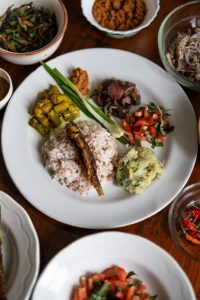Warjri sisters, Daphimanroi Warjri and Dakiwanri Warjri’s culinary journey exploring Khasi delights and presenting it to the world with pride through Symbai pop-up is an innovative inventory representative of the Khasi culture through its distinctive traditional flavours. A seamless sisterly bond that grew entrepreneurial emanating from their love for food is how Symbai pop-up came about. A Khasi food experience that the two sisters have crafted to keep the culinary heritage alive, also provides a window into the region’s diverse, complex and less explored cuisines, now made visible through Symbai. Interview excerpts with Dakiwanri on behalf of Symbai is as follows –

SS: Tell us about the Symbai pop-up. How did it come about?
DW: Symbai came up when Daphi (Daphimanroi) was living in Puducherry and I had done a pop-up with a friend in Shillong. I’ve never done anything like be8ng in a kitchen but she (the friend) guided me. That was in February 2021. Daphi then moved to Puducherry the same year and she cooked Khasi food with some friends in her house which they really liked and suggested doing a pop-up since nobody in Puducherry has eaten nor accessed this sort of food. That’s when Daphi called me and said “let’s do a pop-up”.
SS: How did you coin the name and what is its significance?
DW: It was suggested by a friend to get on social media to get more visibility. That’s when we thought hard and came up with Symbai meaning ‘seed’ in Khasi. We thought it to be apt because metaphorically it means the beginning of a journey and also the starting point for food.
We definitely wanted it to be a Khasi word because we are cooking Khasi food and we would love to represent the Khasi tribe with everything we are doing.
SS: Where did you train/learn or discover your penchant for food? Give the readers a window into your background.
DW: My love for cooking was fairly recent, it was during the lockdown. I’m someone who eats but never cooked, so during the lockdown I wanted to eat so many things but it wasn’t easy to get everything. I realised through the months that I actually like cooking. Daphi has always been a good cook – she started baking at an early age, and she has a bakery now. She always cooks, we’re seven years apart, so I grew up watching her and mum in the kitchen, they were always cooking dinner, especially on Sundays. I’ve learned from all the women in my life and owe them for shaping my interest in food.
SS: The cuisine in Meghalaya is less explored but people are slowly learning about it. What about the Symbai pop-up makes it stand out?
DW: It has been received well, and it stands out because I think people sort of generalised Northeastern food, they clubbed all the Northeastern states together and think we are one and the same which is definitely not the case and so it’s so nice to do this because we set ourselves apart and representing the culture in the correct way. To let people know that there is diversity in the Northeast and that the food in the Northeast is not only about chillies, axone or things like that. A lot of people when they think of Northeastern food they think of Naga food because it’s actually Naga food that sort of has been put on the map, mostly by the Naga people. Symbai then stands out because nobody has done this before by putting Khasi cuisine and food on the national map.
SS: How and why did you decide to have this in Mumbai, per se?
DW: To say that we only do it in Mumbai is not right because we would love people from all parts of the country to taste Khasi food or would want to know what Khasi food is about. We want to do as many pop-ups as possible in all corners of India, if possible and really spread the word. Why we’re doing it in Mumbai is because Daphi lives there and she has a bakery, and I am based in Shillong but it seemed okay for me to shuttle back and forth between the two cities. We’ve had three events here, so we owe it to the fact that Mumbai is a cosmopolitan place and there are people that are open to eating different kinds of food. Also there’s this interesting regional food movement that’s happening and it’s about learning skills, techniques and tips from other chefs that we’ve worked with. These are chefs who have worked at all kinds of restaurants; they’ve studied the culinary arts and everything, learnt French technique but this movement has pushed them to look within the country and starting to appreciate what we have to offer, the country itself and the diversities, cooking methods, the flavours.

SS: Tell us about the menu at Symbai?
DW: We try to work with seasonal ingredients as much as possible, though it maybe a little difficult at times because if it means using a perishable ingredient, then it would be difficult for me to bring it from Shillong because every time we have pop-ups, it’s usually been me flying in from Shillong and bringing stuff from there. We also use dry ingredients but our push is for seasonal ingredients. Traditional Khasi food is made and is eaten for what it is; no tweaks to the menu, no fusion anything, like sometimes for a starter we may do a little bit of a fusion but most of the times, it is as it is, traditionally as it is.
SS: What makes the local Khasi cuisine attractive? What catches the eye of your clients?
DW: What makes the cuisine attractive is the use of indigenous ingredients from the Khasi Hills which are not available everywhere. I think that’s what makes regional food exciting because you don’t get to taste flavours or experience food like that in any other part of the country. It’s specifically from a certain place. That is definitely something I feel that excites people and draws a crowd is that it’s so new, a lot of people who’ve come to our pop-ups said that they’ve never eaten anything like this before, never tasted the spice, never eaten meat cooked this way. It is a novelty factor for people and that that really works, but also hopefully it’s also the factor of the flavours of the food and one keeps coming back for more.
SS: What are some of the bestsellers?
DW: Some of our bestsellers have been smoked pork, black sesame meat is another favourite. We don’t usually do pork with black sesame as it’s traditionally made but we do chicken instead because we cook pork in other ways as chicken is not that flavourful of a meat especially in our cuisine, and it tends to get a little bland in terms of flavour. People love the black sesame paste in general. Others have also really liked the perilla seed paste that we use in our salads. A crowd favourite is the radish with perilla seed paste. Many have told us that “We don’t really eat or like radish but the way the salad is flavoured is beautiful.”
SS: How many team members work with you?
DW: Daphi and I do not have a team, it’s just the two of us. When we do a pop-up, we have two scenarios; one, where we work in a professional kitchen where we are assisted by the chefs there, and the other scenario is, we have a pop-up at a place where they don’t have a kitchen and so we cook everything in prior and carry it to the event or the venue of the pop-up.
SS: Your enterprise is run by the two of you, underscoring a celebration of women friendships, bonds, the unbreakable ties of sisters, as well as Womenprenuers. How has it been for you?
DW:It’s so nice that you looked at it from the point of view of it being womenpreneurs. Honestly, it’s been wonderful! Daphi has often said the same thing. Both of us feel the same way when we talk about how glad we are that we’re doing it as sisters especially because we both grew up with people who love food, love the culture so much and it so nice to be doing it with my sister and I think that is also something that people are drawn to that we are two sisters doing this, so it’s really been a great experience.
SS: What are some of the challenges that you’ve faced along the way and how did you go about solving them?
DW: A frequent challenge that we face is getting ingredients from Shillong because they cannot be sent by post and most of them cannot be dried and used either. We make the most of what we find locally. One example would be when we do the winter salad comprising orange, pomelo and mustard seeds salad which is staple during winters in Shillong, we have it as a starter in our Symbai menu during the winter. In such times, I carry the oranges from Shillong, when possible. On a few occasions, we’ve had to use oranges available locally which are definitely not the same as the Sohra oranges and we all know how good those ones are. The same goes for other ingredients like mustard leaves which are available in Mumbai or anywhere else in India, but are not the same, as they taste similar but it’s not exactly the same thing.
 SS: What does a typical plate at Symbai look like and represent?
SS: What does a typical plate at Symbai look like and represent?
DW: A typical plate in Symbai has many local elements. In terms of design, we use the ‘Ryndia’ print for our napkins, we use little ‘Khoh’ as table décor. The food plate usually has the ‘Ja stem,’ (Yellow rice), a non-vegetarian spread which consists of three types of meat, whatever is available in the area, as well as three vegetarian options, and salads and chutney shared by both types of eaters. Definitely represents the Khasi culture and as authentic as possible, without making any alterations to the originality of a dish or what it should taste like.
SS: Recently, Nambie Marak also represented Meghalaya nationally at the Masterchef competition. What are your thoughts on the culinary talent in the state? Also, do you have similar plans of partaking in such forums?
DW: Yes I know about Nambie Marak, and I believe that the culinary talent in the state is great. I’ve met a few talented chefs and that’s when I realised that people started to look within and not outward for inspiration. We have so much to offer in terms of Khasi cuisine and spices that we use and the methods of cooking, it’s just so diverse including Garo and Jaintia food. Chef Tanisha Phanbuh who’s in Delhi has been doing pop-ups and she’s been cooking Khasi food, introducing the people to the cuisine. As far as us taking part in such forums, we would love to but as of now we’re both happy and content doing pop-ups and just see where it takes us.
 SS: In your opinion, why do you think food from Meghalaya and the NE is still left unexplored?
SS: In your opinion, why do you think food from Meghalaya and the NE is still left unexplored?
DW: If I were to be honest, I think this is not an answer everybody would like to hear but when it comes to Northeastern cuisine, people tend to look for food inspiration from the west because we are not proud of what we have to offer. However, there is a shift now, where people are beginning to understand that you are your culture, you are what you bring to the table, and everybody is looking for something new now, that’s how the world works, looking for something new and exciting. I would say Northeastern culture, when it comes to food, is not well appreciated or very well-known because people have always associated us with eating less luxurious food. This is changing now because celebrated chefs who are now understanding the value of regional food.
There is also a common misconception about Northeastern food that it is mostly non-vegetarian considering the fact that India is largely a vegetarian country. So, people have some apprehension there but we do have a lot of vegetarian options. It’s just that people have not really explored those options yet. Even with Khasi food we’ve had a bit of difficulty in trying to build a menu, through the pop-ups that we’ve done, the veg food that we’ve put out, vegetarian people that attended actually said they liked everything. I know of other Chefs who are exploring vegetarian cuisine in the Northeast.
——End of Interview——–
The offbeat cookhouse of the Warjri sisters sets the benchmark of celebrating one’s roots, culture and pride in it by propelling the identity of being Khasi bigger and better.
(Interviewed by Esha Chaudhuri)



